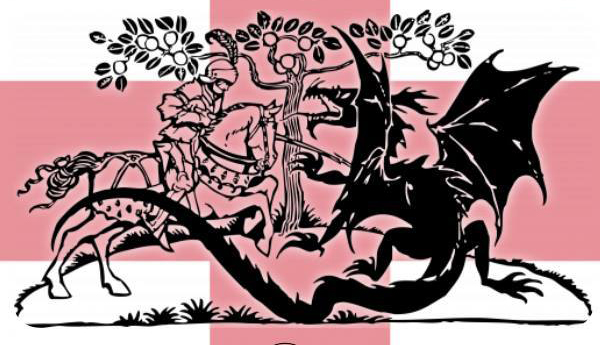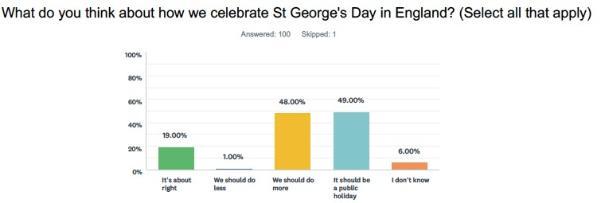
Professor John Denham, Director of the Centre for English Identity and Politics, explores the newly-published results of a survey carried out by University of Winchester students into attitudes around St George's Day and national identity.
More should be done to celebrate St George's Day, say many people who attended Southampton's St George's Day festival in 2017. Nearly half wanted to see St George's Day become a new public holiday, in a survey carried out by University of Winchester students.
The Southampton festival was started in 2014. From the outset, organisers wanted the event to be both distinctively English, and inclusive of the city's varied ethnic communities. The festival tag line declares that 'Southampton is a great English city that has always been built by all the people who have made their lives there'. (Declaration of interest: Professor John Denham, author of this blog, has chaired the organising committee since the festival's inception)
The survey confirmed that the festival attracted a diverse audience. Three quarters had been born in the UK and one quarter outside. Of those who volunteered an ethnicity, two-thirds were white, and one-third black, Asian or other minority ethnicity.

The 2017 event had a focus on the iconic Spitfire, designed, built and first flown in Southampton, and on the Polish squadron that has been the plane's most deadly pilots. Members of the local Polish community - both recent migrants and those English born - took part in the festival and were included in the student survey. (A video about the Spitfire and others produced for Southampton St George by Southampton Solent University students can be seen here. Winners of the Southampton St George Community Awards, supported by the Daily Echo, can be seen here.)
Not surprisingly, those born abroad were more likely to say they were neither English nor British, although a significant minority of UK born people also rejected both identities. Nonetheless, the majority broadly reflected the spread of identities in the wider population of England, with 'equally English and British' being the most widely held identity. As in national surveys, white attendees were more likely to identity as English than BAME visitors, although the samples were too small to give robust figures. Perhaps surprisingly for a St George's Day event, more people identified as primarily British than primarily English.

It appears that the festival had an impact on many of those attending. Over a quarter said the event had made them 'feel more English' (and none said less). Only a quarter had primarily attended the festival to celebrate England's national day, but over half still said it was important to them to celebrate St George's Day. Indeed, British identifiers and those who said they were neither British nor English, were more strongly in favour of increased celebration of England's national day than the English. It is possible that the festival, with its focus on an inclusive English identity, may have encouraged some to think differently about English identity. It's also possible that some of the foreign-born participants were surprised that English identity is less well celebrated than other national identities.

In parallel with the main festival, nearly 30 small community events were organised across Southampton with the support of the City Council and Southampton Voluntary Services. A parallel survey of 70 participants showed broadly similar and diverse participation and responses.
While not too much weight can be placed on a small scale and limited survey, a broad conclusion might be that the Southampton festival, with its inclusive narrative, succeeds in attracting participants from across a diverse city, yet maintains a distinction and popular English identity.
The survey was conducted under the Winchester Research Apprenticeship Programme by Bruce Mercieca (BA Hons Politics and Global Studies) and Nora Medboe (BSc Hons Psychology), under the supervision of Professor John Denham.
Back to media centre